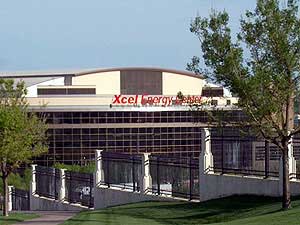|
Audio
Photos
Resources
Your Voice
|
Boon or boondoggle? Officials tout economic impact of Xcel Center
October 7, 2003
Just over three years ago, the Xcel Energy Center opened in downtown St. Paul with the first ever home game of the Minnesota Wild. Critics questioned whether the 18,600-seat arena would be worth the public money that went into it. St. Paul and Minnesota Wild officials have unveiled a study they say shows the arena pumping money into the local economy. But the skeptics remain.
St. Paul, Minn. — The Xcel Energy Center cost about $175 million to get up and running. At least 75 percent of that money was public, from the state and the city of St. Paul.
The Xcel Center funding was approved in 1997, even as voters and lawmakers rejected the notion of public money for others sports stadiums. Both the Twins and Vikings have repeatedly come up empty.
So officials associated with the Xcel Center are anxious to show their arena is an economic engine, and a new study commissioned by the St. Paul Area Chamber of Commerce seems to fit the bill. It puts the economic benefit to the Twin Cities at $247 million this year alone, and projects that number will grow steadily over the next decade.
 | |||
Business-people like David Fhima feel the effect of having the arena nearby. Fhima is a chef who opened his upscale downtown St. Paul restaurant in 2002, where the press conference announcing the report was held.
"It is so obvious when there is an event at the Xcel Center, when there is a game at the Xcel Center, what it translates to for our business," Fhima told the crowd. "On event nights, when there was a hockey game, when there was a concert, we were refusing people right and left."
The new report, by a St. Louis-based firm, looked at a variety of factors. Xcel Center events this year will draw about two million people, who will spend money on tickets, food, and gas. The Center supports more than 1,100 jobs, and its operating expenses will put $75 million into the Twin Cities' economy. This year the Center and its workers should generate $9 million in state income taxes.
Senator Norm Coleman was St. Paul's mayor when the Xcel Center was conceived and built. "When you have an inflow of dollars into an urban center, that is a very good thing. It's a good thing for everybody," Coleman said. "When you bring forward, raise the level of optimism, when you create that positive sense, people feed into that. It also helps when your team wins, by the way. That's a good thing."
 | |||
In fact, the study does not account for the possibility that the Minnesota Wild might hit a rough patch and become a less popular attraction. But officials point to the long waiting list for season tickets, and point out that more than 100 non-hockey events each year actually draw more overall people than hockey.
The popularity of the Xcel Center for concerts and other events highlights another concern of critics, who say the economic benefit to St. Paul comes at the expense of other areas. Chef David Fhima owns another restaurant just blocks from the Target Center in downtown Minneapolis. He says that neighborhood has seen a slowdown, partly because the Xcel Center is more attractive to fans and concert promoters.
"There's no denying it," Fhima said. "You have a state-of-the-art venue like that, it's going to impact the Target Center. It is."
Professor Andy Zimbalist is an expert on sports stadium economics at Smith College. "Whenever an independent economist has looked at this question, they have concluded that at best you can expect a neutral impact from a new arena or new stadium," he said.
Zimbalist says there are reasons to take any measure of economic benefit with a large grain of salt, especially a number like $247 million a year.
"I would say it's extraordinarily improbable and that it would be definitely off the charts," Zimbalist says. "There would be no other case that would be remotely similar if that were happening. I haven't seen the study, but I can tell you that this type of study has a typical set of defects. I can almost imagine what the assumptions are and what the methodology is that generates these types of results."
Despite such strong skepticism, the new report will be used to advance the cause of publicly funded stadiums. After applauding the results, St. Paul Mayor Randy Kelly said the city was moving ahead with a new project: Investigating two sites that would each be "fabulous" as a new home for the Minnesota Twins.
|
News Headlines
|
Related Subjects
|

